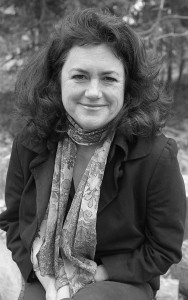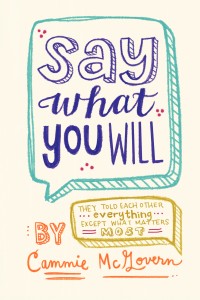
Threads that bind a novel together oftentimes are collected from an author’s experiences. After raising an autistic child and being involved in the Whole Children organization, Cammie McGovern is especially attuned to children with special needs. These heighten sensitivities enabled Cammie to craft a heartwarming and thought provoking story that centers on the friendship between a teenage girl struggling with the limitations of cerebral palsy and a teenage boy who is coping with obsessive compulsive disorder.
Later this week, I will post a review of Say What You Will. Today, Cammie is being interviewed about her background, her desire to help special needs children and young adults, and her writing.
Welcome Cammie McGovern.
Some people start writing in their youth while other authors develop their writing passion over time. When did you head down the writing career path? What steps did you take to achieve your goal?
Though I always kept a journal as a child and young teenager, I didn’t start writing in any serious, focused way until AFTER I graduated from college. I went to a college (Kenyon) that has a wonderful literary reputation but at the time offered no creative writing classes. It was only in the second semester of my senior year that I convinced a theater professor to let me do an independent study on playwriting. That was when I really fell in love with writing. Even though I was terrible at it in the beginning, I didn’t care. I simply LOVED doing it. When I graduated and moved to New York, I pretended to be interested in other kinds of careers, but my secret was always this little tendency I had to stay up all night working on stories and plays that weren’t all that good. After four years—and some mixed success with plays and screenplays—I realized that my true passion was fiction. I applied to MFA programs and went to University of Michigan which I loved. Later I got a Stegner Fellowship at Stanford which provides two years of financial support to pursue writing, an invaluable gift to any beginning writer.
To date, you have published 4 noteworthy novels. The first three books were marketed to an adult audience even though the content was suitable for young adults. Your fourth book, Say What You will, is labeled a YA novel. Why did you choose to shift genres?
I now think I was always meant to be writing for YA and Middle Grade and just took a long time realizing this. Not that I didn’t enjoy writing my adult books, but I think my writing strengths lie in this area. Maybe because I kept a journal for so many years of my childhood, it comes back to me fairly easily. Late adolescence was also the time I fell in love with reading. Oddly, even though I had no connection to disability at that point, many of my favorite books at that age centered around characters with disabilities (Flowers for Algernon, I Never Promised You a Rose Garden, David and Lisa, remember all those?) I didn’t start writing SAY WHAT YOU WILL (my first YA) until I’d gotten acutely frustrated with a few other (adult) novels that I’d been struggling with for a while, and then the idea came as a tremendous relief: maybe I can write a YA book like the ones I loved as a teen! It was thrilling and the book came pretty easily, which the ones before certainly hadn’t.
Every parent hopes and dreams that their children will be healthy and not have any physical or mental limitations. As a parent of an autistic child, when did you first realize that your eldest child was having difficulties? How much time passed before you received a diagnosis? What strategies did you use to cope with your family’s situation?
I spent far too long in denial about the extent of my oldest son’s delayed development. He wasn’t diagnosed until just after his third birthday, but his differences were clear from the very beginning, when he was a colicky, difficult, allergic-to-everything baby. We knew he had delayed speech and development, but I mistakenly believed that getting a diagnosis would limit how teachers and others perceived him. Now I understand the opposite is true. A diagnosis helps enormously in understanding what you’re dealing with and getting the help you urgently need. Autism is a life-changing diagnosis for everyone in the family—especially early on when you must become an expert on the array of treatments and figure out which ones make sense for your child. For any parent at the start of this journey, my quick, reassuring answer is that it only gets easier as time goes along, no matter where your child ends up on the spectrum of low-to-high functioning. The early years feel like a battle against the autism which has taken your child, and then, after a certain period, you learn to embrace and celebrate the child autism has left you with. It’s taught me a lot about accepting my own shortcomings, actually.
In 2004, you were instrumental in starting an organization called Whole Children. This group provides services for special needs children. What role did you plan in its formation? Where is Whole Children located? How is this group different from other social service organizations that focus on special needs children?
Whole Children began with because I was lucky enough to meet a group of very smart, capable women who all had children diagnosed with disabilities at the same time my oldest son, Ethan, was. Originally the idea was to create a small center that would run afterschool gymnastics classes for kids with special needs to work on their motor skills issues and socialize at the same time. It grew very quickly, in part because it answered a need no one recognized at the time—many families were struggling to find affordable therapies for their kids who needed a lot of help. Within a few years we were serving close to two hundred kids and their families in classes that ran year-round. Now we’ve expanded even more with programs that include infants, young adults, theater, music, vocational skills, sports, and sexuality. It’s been 10 years, and we currently serve just over 700 folks and their families. I’ve learned many things from being involved in such a venture, but the main gift it has given me is the lifeline of friendships with other families and parents.
Many authors turn to their own lives for book ideas. Since your books include characters that are coping with challenging limitations, did you use your personal life as a template? Where did you gather background information about cerebral palsy and obsessive-compulsive disorder?
I originally got the idea for Amy’s character from the daughter of one of the original fellow moms who founded Whole Children. She was born with significant CP and her parents were told she would probably never walk or talk. At age three, she struggled to sit up and roll over, but even as sat in her bouncy-seat at our meetings, it was clear to me that she had more going on than doctors might have realized. She had a beautiful laugh that always came just as the moms in the room were sharing a joke, as if she’d understood everything we were talking about. It got me thinking about what life might be like for her down the road, as a teenager with a very different body and a mind that was sharp.
Do your characters project images that vary from the usual perception of disabled people? Are you intentionally trying to create a better understanding of people who are coping with mental and physical challenges?
Considering people with disabilities make up the largest minority group in this country, I would argue we don’t have nearly enough books/movies/TV shows featuring characters with disabilities at the center. Yes, I’d love to see more of this all around. My hope in writing about Amy and Matthew was, in part, to demystify the experience and let people know—yes, people with disabilities are funny, tough, silly, anxious, ambitious—all the same qualities that everyone else has.
Have you ever participated in a writing group and/or attended a writing conference? If so, did you find the experience(s) to be beneficial?
Writing groups and MFA workshops were essential to me in finding my voice as a writer and (equally important) toughening me up to share work and get criticism on it. There’s also a point when groups can become detrimental to the practical business of getting on with earning a living at writing. There’s a balance, I believe.
A significant portion of the book focuses on email correspondence and the transcriptions that are vocalized through a talking computer. Does this reoccurring format affect the overall pace of Say What You Will?
I’m surprised by how many folks have said the chapters of “unsent emails” are their favorite parts of the book. I’m not even sure where that idea came from, but I started the book with the idea of writing about two friends who communicate beautifully about everything except their feelings for each other and that seemed to be the most natural way to convey this. They have many things they want to say to each other and can’t or haven’t figured out how to yet.
In addition to writing and publishing books, authors need to find time to market their work. What is your best resource?
I don’t consider myself terribly adept at self-promotion. I’m trying to learn more about using social media and Facebook and Twitter. I think these are wonderful resources for hearing from readers and interacting with them.
Are you currently working on a new project? If so, can you briefly describe the book(s) and anticipated publication date(s)?
My next book is just finished (hopefully! I just turned it in!) and due out next fall. It’s also a YA love story that features characters with disabilities. This time, much of it centers around a sexuality class taught at a center like Whole Children, where two typically-developing teens are volunteering as part of their community service requirement.
In exchange for an honest interview and review, Cammie sent me a copy of Say What You Will.
Related Blogs
Q & A with Ruth Tenzer Feldman
Sandra’s Bio
Sandra Bornstein is the author of MAY THIS BE THE BEST YEAR OF YOUR LIFE. It is available on Amazon. Sandra’s memoir highlights her living and teaching adventure in Bangalore, India. She is a licensed Colorado teacher who has taught K-12 students in the United States and abroad as well as college level courses. Sandra is married and has four adult sons. The memoir was a finalist in the Travel category for the 2013 Next Generation Indie Book Awards, the 2013 International Book Awards, the 2013 National Indie Book Excellence Awards, the 2013 USA Best Book Awards, and received an Honorable Mention award in the Multicultural Non-Fiction category for the 2013 Global ebook Awards.

Leave a Reply
You must be logged in to post a comment.